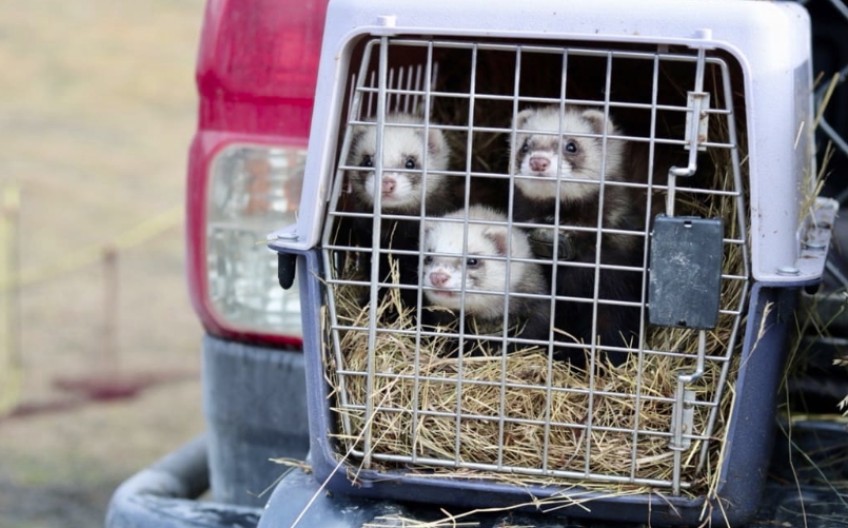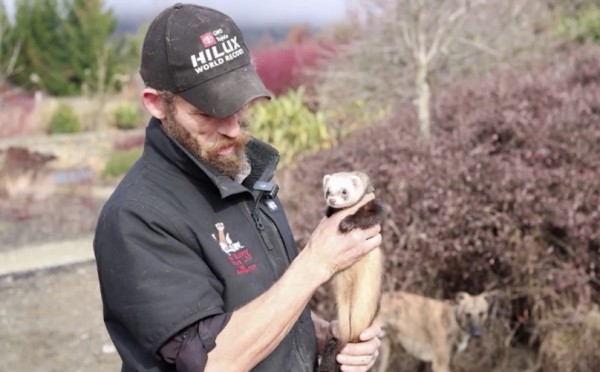Ferrets enlisted in Queenstown rabbit fight

A team of tamed ferrets has been making short work of a long-eared problem in the battle against Queenstown's rampant rabbit population.
The mustelids are part of an unusual pest control operation run by Jim Curry and his partner Jacqui Elson, who believe the best way to fight an introduced pest is with another.
Earlier this week, star ferret Oprah Winfrey took the lead to flush out a warren at a vacant property in Lower Shotover, as detection dogs waited at the ready to catch runaways.
Curry said the premise was simple - fences up, ferret in and "hopefully we'll watch the fireworks as rabbits come flying out both sides".
Over two days of methodical work, the ferrets managed to flush out more than 100 rabbits, which were quickly dispatched with a break of the neck.
Elson said it was just another job in what had become a near non-stop string of requests since relocating their business 'Jim's Bunny Hunters' to Queenstown.
She said they took on work across farms, lifestyle blocks and commercial sites, often booked by curious locals who had seen their rabbit-laden ute.
"They'll stop and follow us into like petrol station or cafe or something, because they've seen what we've got on the ute. People will literally stalk you into a petrol station saying 'I saw your licence plate. We need you,'" she said.
Curry said school pick-ups were especially time-consuming because of the ferrets' popularity - and trips around the country often garnered a lot of attention.
"We're the only people licensed to transport ferrets all around New Zealand, between islands, which gets you some interesting look on the ferries," he said.
As the ferrets flush out the warrens, rabbits emerge into a fenced-off area where they're caught by detection dogs. Photo: RNZ / Katie Todd
A safer way to tackle the problem
Each of the ferrets was caught from the wild, mostly by Curry.
They could not be imported or bred because ferrets are classified as an "unwanted organism" under the Biosecurity Act.

Jim Curry says they are the only people licensed to transport ferrets all around New Zealand.
While Curry and Elson were not the only ferreters in the region, they had special MPI approval to keep more than the usual limit of three ferrets.
Elson said the ferrets were highly effective hunters and were a safer alternative to poison.
On a recent job, she said their results eclipsed those of professional shooters.
"The commercial shooters were getting, I think they said about 900, 1000 in a year, and we got about that, including young ones, in three-and-a-half days," she said.
"They were getting predominantly males, whereas because we're using the ferrets to get into the holes, we're getting predominantly females with young as well. So it's more efficient, makes a huge difference," she said.
Jim Curry grew up in the UK and said ferrets had been a "lifelong obsession". Photo: RNZ / Katie Todd
Elson said they made the most of each rabbit caught.
"We can use an introduced pest, to then catch other introduced pests and then use the rabbits to give back to wildlife rescues for hawks and falcons, little owls, or other zoos. Whatever else isn't fed to our animals then goes to trapping programmes for wild cats, other ferrets, stoats, rats," she said.
After each hunt, Elson and Curry filled in the rabbit holes to make sure the area was clear, then if any rabbits remained they would return under the cover of darkness for shooting.
Curry said often the most challenging part of the operation was coaxing the ferrets back out, which were known to linger obstinately underground, despite wearing special tracking collars.
"The stubborn ones can take a bit of work to get out," he said.
A dream realised
Ferrets have been a lifelong obsession for Curry, who grew up in the UK.
"I'd been reading all the Farmer's Weekly magazines and various hunting magazines and books and things about ferreting for years. I always wanted to do it, but I didn't have the money or the knowledge or the land," he said.
Hillary Clinton, Kamala Harris and Jacinda Ardern waiting to be deployed for work. Photo: RNZ / Katie Todd
Seven years ago in Darfield, someone posted on Facebook about a chicken killer and Curry retrieved the culprit - a ferret he dubbed Colin Farrell.
Two more followed and soon Curry was not just rescuing ferrets but putting them to work.
"I just went 'right, sod this, I've always wanted to do it'. I ordered some trackers and then ordered purse nets from the UK. It basically started with me knocking on people's doors saying 'hi, I see you've got some rabbits. Can I come and catch them?'" he said.
The pair began in Canterbury but Elson said it was a no-brainer when the opportunity arose to shift to rabbit-plagued Queenstown.
Curry said the ferret flock had expanded to a star-studded line-up over time.
"We have Oprah Winfrey, Hillary Clinton, Kamala Harris, and Jacinda Ardern, an R Kelly, a P Diddy and a Drake. And then we have a Joe Biden," he said.
A persistent problem
Otago Regional Council (ORC) considered rabbits one of the area's worst pests, posing a serious threat to the local biodiversity, the environment and economy.
Southern Lakes Sanctuary chief executive Paul Kavanagh said they were known to let other predators thrive and tore up land and ate fertile grass, with 10 rabbits devouring the equivalent of one sheep's requirements.
"In many of our ecosystems in central Otago, predator numbers are controlled by food availability. So where we get a lot of rabbits, we in turn get a lot of feral cats, stoats, ferrets, weasels," he said.
He described the region's rabbit numbers as "relatively out of control".
"Anecdotally, we've heard it's getting worse in some areas, especially Cromwell, places like that," he said.
In 2023 the ORC discovered rabbit densities of up to 16 rabbits per square kilometre in some parts of Otago.
The council said it was undertaking further rabbit night counts across the region and expected to have updated population estimates soon.
Staff regularly carried out inspections across the region to identify rabbit hotspots and had helped to develop five "community rabbit management programmes" across the region, the council said.
The ORC said it could help landowners tackle their rabbit problem but ultimately it was the landowners or occupiers responsibility to manage the problem.





















